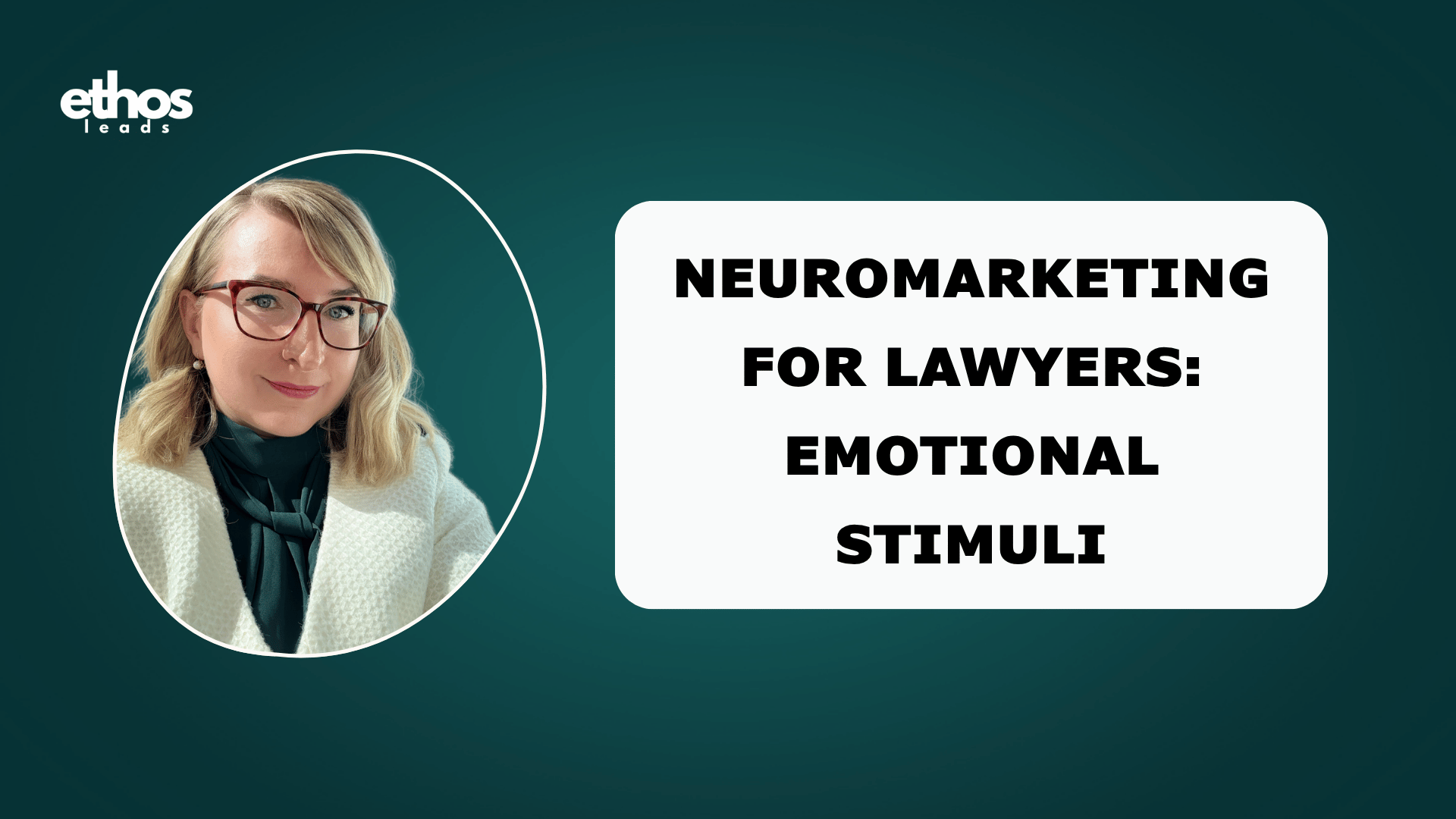Neuromarketing for Lawyers: Emotional Stimuli
Why Emotion Drives Every Legal Decision
Running a law firm isn’t just about winning cases. It’s about persuading people to trust you with their most urgent problems. And persuasion doesn’t start with logic, it starts with emotion.
When clients choose a lawyer, they often tell themselves they are making a “rational” decision: comparing fees, experience, and outcomes. But neuroscience shows this isn’t true.
Neuromarketing research shows that there is no such thing as a purely rational decision. The primal brain, the oldest part of our nervous system, makes choices based on emotions first. Logic only comes in later to rationalize what we’ve already decided.
For lawyers building a practice, this has huge implications: if your marketing is purely rational (“We have 20 years of experience,” “We care about clients,” “We fight for justice”), you’re missing the very triggers that drive decision-making.
This means your ability to connect emotionally with clients is just as important as your ability to present logical facts. Without emotion, your message won’t stick, won’t persuade, and won’t inspire action.
The Science Behind Emotional Stimuli
Emotions shape decisions below our conscious awareness. We decide emotionally first and rationalize later.
According to psychologist Robert Plutchik’s model, there are eight core emotional states:
- Avoidance Emotions: Fear, Disgust, Anger, Sadness
- Approach Emotions: Anticipation, Joy, Trust, Surprise
Research shows:
- The primal brain pays attention to negative emotions first because they signal danger and survival risks.
- But to persuade, you must also activate positive emotions, like trust and anticipation, to inspire action.
Emotional lift occurs when you guide prospects from negative emotions (acknowledging their pain) to positive emotions (presenting your solution). This creates the neurochemical conditions necessary for decision-making.
This emotional lift (moving clients from fear to hope) is one of the most powerful persuasion tools available to lawyers.
Why Emotions Matter in Legal Marketing
Legal services are deeply emotional. People don’t call lawyers because they’re having a good day, they call because they’re in pain:
- Fear of losing freedom (criminal defense).
- Anxiety about losing children or property (family law).
- Stress from debt collectors (bankruptcy).
- Anger at unfair treatment (employment law).
By understanding and addressing these emotions, lawyers can:
- Show empathy and build trust.
- Make their message more persuasive.
- Stay memorable in moments of crisis.
How to Apply Emotional Stimuli in in Your Law Firm’s Marketing:
Here’s how solo lawyers and small firms can ethically use emotional stimuli:
1. Start With Negative Emotion (Fear of Regret)
Among all emotions, the fear of regret stands out as the most powerful negative emotion for persuasive messaging. We experience regret in two scenarios: when we choose an option that turns out badly, or when we pass on an option that proves better than maintaining the status quo.
For legal clients, regret manifests as:
- Fear of choosing the wrong attorney
- Anxiety about missing critical deadlines
- Worry about inadequate representation
- Concern about settling for less than they deserve
Examples:
Estate Planning: "Without proper estate planning, your family may face months of probate court, expensive attorney fees, and potential family conflicts over your wishes."
Business Law: "Operating without proper legal structure exposes your personal assets to business liabilities and could cost you everything you've worked to build."
The key is to authentically represent real consequences, not manufacture artificial urgency.
2. End With Positive Emotion (Anticipation and Relief)
After acknowledging pain points, the most effective approach generates anticipation, a prediction that engaging with your services will deliver excitement, joy, pleasure, or happiness. Anticipation stimulates dopamine production, creating positive associations with your firm.
Effective anticipation messaging for lawyers might include:
Family Law: "Picture moving forward with confidence, knowing your children's future is secured and your financial interests are protected."
Criminal Defense: "Experience the peace of mind that comes from having a skilled defender who knows the system and fights tirelessly for your rights."
Move clients from pain → relief, fear → hope, regret → anticipation.
3. Use Stories to Trigger Mirror Neurons
Stories allow clients to “feel” another person’s pain and relief. When you act out or describe client struggles, you trigger mirror neurons in the brain, making prospects emotionally relive the experience.
Example:
- “A client came to us terrified of losing her home to foreclosure. We stepped in, fought back, and today she and her family are still in the house they love.”
Narratives create empathy, which drives emotional connection.
4. Balance Logic With Emotion
Clients still want rational proof but emotion comes first. After engaging emotions, support with facts, evidence, and credentials.
Example:
- Emotional: “You shouldn’t lose your job because of discrimination.”
- Rational: “We’ve successfully won compensation for over 150 employees facing workplace bias.”
Emotion opens the door. Logic seals the deal.
Ethical Considerations for Legal Professionals
While emotional appeals are powerful, legal professionals must use them responsibly:
Do:
- Acknowledge genuine client concerns and pain points
- Present realistic outcomes and expectations
- Use emotional connection to build trust and rapport
- Focus on serving client interests
Don't:
- Manufacture false urgency or artificial scarcity
- Exploit vulnerable emotional states
- Make unrealistic promises about outcomes
- Use fear tactics that don't serve client interests
The Competitive Advantage of Emotional Intelligence
Law firms that understand and ethically apply emotional stimuli principles gain significant advantages:
- Higher conversion rates from prospects to clients
- Stronger client relationships built on emotional connection
- More effective case presentations that resonate with judges and juries
- Increased referrals from satisfied clients who felt understood
- Better team culture when emotional intelligence guides internal communications
Key Takeaways
To make your legal marketing persuasive:
- Start negative. Fear of regret grabs attention.
- Lift positive. Anticipation inspires action.
- Tell stories. Trigger empathy and memory.
- Mix emotion with proof. Feelings open the door, facts keep it open.
- Be authentic.Forced emotion feels manipulative, sincere empathy builds trust.
Emotions are the glue that make your message memorable. For law firm owners, the most powerful pairing is:
- Fear of regret → “What will it cost me if I don’t act?”
- Power of anticipation → “What could my life look like if I choose the right lawyer now?”
When you speak to both, you don’t just inform, you persuade. And you do it in a way that respects your clients’ humanity and your profession’s ethics.
Related Articles:
Neuromarketing for Lawyers: An Ethical and Practical Guide for Solo and Small Law Firms
Neuromarketing for Lawyers: Personal Stimuli
How Personal Stimuli Convert More Clients
Neuromarketing for Lawyers: Contrastable Stimuli
Neuromarketing for Lawyers: Tangible Stimuli
Neuromarketing for Lawyers: Memorable Stimuli
Neuromarketing for Lawyers: Visual Stimuli
Neuromarketing for Lawyers: Emotional Stimuli
Neuromarketing for Lawyers: Integrating the Six Stimuli
FAQs About Emotional Stimuli in Legal Marketing
- Isn’t using emotion manipulative?
Not if done ethically. You’re not creating fear, you’re acknowledging real client concerns and showing solutions. - Should I always highlight negative emotions?
Yes, but briefly. Start with pain, then quickly move to hope, trust, and relief. - What if my clients are businesses, not individuals?
Businesses are still run by people. Business owners feel fear (loss of revenue), anger (unfair treatment), and anticipation (growth, protection). - How can I use emotional messaging in consultations?
Start by validating the client’s fears: “I know this feels overwhelming.” Then close with anticipation: “Here’s how we’ll help you take back control.” - Which emotions are most persuasive for lawyers?
- Negative: fear of regret, sadness, anger at injustice.
- Positive: trust, anticipation, relief.






